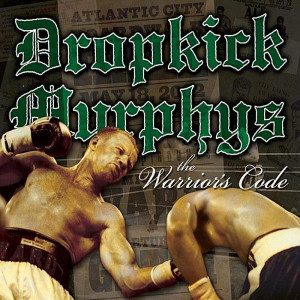 Dropkick Murphys for nearly a decade now have been making an energetic blend of hardcore punk and Irish folk music, with a vigorous dose of Boston pride thrown in. It’s something like The Pogues with more rock and lyrics you can (more or less) understand, done at breakneck speed like, say, Stiff Little Fingers, and with the vocal fury of Social Distortion or Rancid. Their latest, The Warrior’s Code, is a raucous and uplifting slab of harder-faster-louder Celt-rock by a mature band. It’s making a strong bid to become my feel-good disc of the summer of ’05.
Dropkick Murphys for nearly a decade now have been making an energetic blend of hardcore punk and Irish folk music, with a vigorous dose of Boston pride thrown in. It’s something like The Pogues with more rock and lyrics you can (more or less) understand, done at breakneck speed like, say, Stiff Little Fingers, and with the vocal fury of Social Distortion or Rancid. Their latest, The Warrior’s Code, is a raucous and uplifting slab of harder-faster-louder Celt-rock by a mature band. It’s making a strong bid to become my feel-good disc of the summer of ’05.
The album begins with a lilting air in slow waltz time, played on piano, accordion and pipes; anybody unfamiliar with what to expect from the Dropkick Murphys risks a heart attack when, after a few lovely measures, the volume is punched and the tempo ratcheted violently upward as instruments more suited to punk rock – slashing guitars and shouting guttural vocals – kick in. It’s “Your Spirit’s Alive,” dedicated to a fallen friend, and also paying tribute to two Boston pro athletes who died on a hijacked plane on Sept. 11, 2001.
The final track on the regular program, “Last Letter Home,” also is a tribute, this one to a fan, Sgt. Andrew Farrar, who died in Iraq in January 2005. He had asked that the Murphys’ version of “The Fields of Athenry” be played at his funeral should anything happen to him. This song includes the melody of that pipe tune, and its lyrics are composed mainly of letters written by Farrar to his family, and other correspondence between soldiers and their families. It’s a passionate and moving tribute. (The band, by the way, did play at his memorial service.)
The title track, a raucous rocked-up reel, pays tribute to Massachusetts boxer Micky Ward. Whistle and pipes in the chorus lend it a jaunty feel, and bassist Ken Casey and singer Al Barr trade lines in their typical style of duet.
The disc’s social and political commentary continues with the straight punk anthem “Citizen CIA,” with verses like this one: “Now I’ve trained an army for my kids to fight one day/We’ll teach them all our secrets and then we’ll walk away…” and the title shouted out as the chorus. Subtle it’s not, but the band’s not incapable of subtlety, as it shows in its cover of Eric Bogle’s ballad of a fallen Irish soldier in World War I, “The Green Fields of France.” This one starts out with just a piano as accompaniment, and by the end pipes, whistle, accordion and cello have been added for full emotional effect. Another cover song, “The Auld Triangle,” is a prison ballad written by Irish poet Brendan Behan and previously recorded by The Pogues.
But everything’s not blood and guts and protest. “Captain Kelly’s Kitchen” is a traditional piece arranged in the band’s own unique way, the tale of a hapless greengrocer’s lad jailed for allegedly molesting the Captain’s scullery maid, with a rousing “toora-loora-la” chorus. “The Walking Dead” pokes fun at younger musicians, with an in-your-face chorus of “What’s so new about what you’re saying? / Just another generation with the same sad song.” And “Wicked Sensitive Crew” has even more fun at the expense of “pop punk tough guys with neck tattoos,” and a satirically atavistic punk chorus of “Hey! Ho! Hey! / You gotta shake hands with your feelings/In the Wicked Sensitive Crew.” And the band puts its own spin on a previously unrecorded Woody Guthrie lyric, a grimly comic shanty about a one-legged sailor in “Sailing Up to Boston.”
The biggest treat, though, is the bonus track, and it’s a bonus that actually lives up to its billing. It’s a reprise of a song that was released on an EP in the summer of 2004, designed to cheer on the Boston Red Sox. Over the months since its original release, it became a de facto anthem of the team, and gained even more notoriety when the Sox went on to win the World Series for the first time since 1918.
The song is called “Tessie,” and it’s actually a meta-song, or a song about a song. The original “Tessie” was a Broadway show tune from 1902, sung at games by a Red Sox fan club called the Royal Rooters. This new version, written by the Murphys and Boston sportswriter Jeff Horrigan, incorporates some of the original lyrics, and also tells a legendary story about the Rooters storming Fenway Park during a game. [Update: You can read more of the backstory at ye olde Wikipedia.]
Back to the song itself … it’s an insanely catchy anthem with a sing-along chorus that won’t quit, and has backing vocals from a number of team members and others. I defy anyone but a die-hard Yankees fan to listen to this without falling under its spell.
Just about the only thing I can complain about regarding The Warrior’s Code is the hideous oblique script typeface used for the credits on the back of the booklet. And some more detailed musicians’ credits would be nice. But if you’re in the mood for fun, inspiring, uplifting folkish punk rock, look no further. This one’s a winner.
(Hellcat, 2005)
